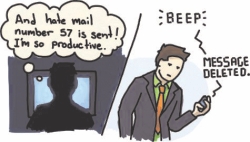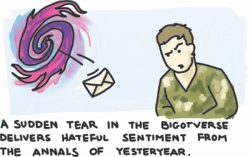| Home - Back Issues - The Team - Contact Us |
 |
| Volume 11 |Issue 11| March 16, 2012 | |
|
|
Musings
Hate Mail is Good for Health Syed Badrul Ahsan Hate mail can be a pretty illuminating affair at times. It not only re-energises the one who is the object of it. It also demonstrates, to a degree no other form of writing or conversation can, the low depths to which the one who sends off the hate mail can sink. From such a perspective, you could argue that hate is either productive for those subjected to it or profoundly revealing about those who indulge in it with passion. Long years ago, when I first began to write for newspapers, I made it clear, through my articles and then columns, where I stood on politics. My references to Sheikh Mujibur Rahman as Bangabandhu produced a voluble series of cacophonous noises from readers who surely had been made happy that the Father of the Nation had died in such tragic manner. A particular individual who happened to be a young academic at a university was repeatedly incensed at my writings, the result of which was a recourse on his part to throw language at me that was certainly below the belt. Young as I was myself, it was for me huge pleasure hitting him back in his own coin every time he hurled mud at me. It went on for sometime, until at one point it came to a stop.
During my years in London as media spokesperson at the Bangladesh high commission in London, I found myself involuntarily drawn to an epistolary brawl with a veteran Bengali journalist settled in the United Kingdom. It was a time when matters within the Sonali Bank London branch were being vigorously investigated by the resident manager. It was obvious that an influential section of expatriate Bengalis was determined to put a stop to the investigation and to have the manager recalled to Dhaka. At some point, the journalist in question wrote on the Sonali Bank in the Bengali tabloids there and in the process indulged in an untruth, to which I responded the following week. The week after that, he wrote again, this time on my professional abilities and my poor state of English. I hit back and so it went on, until he asked the high commissioner if I could be persuaded to stop writing back. I promised to do so provided he did it first. He did and then I did. I need not explain that those write-ups by the journalist were in bad taste. And I thought — and I still think — that letting people get away with personal attacks was and is not a very healthy thing to do. In these past many years, there have been the times when readers who fired off crude e-mails to me because they did not like what I wrote have borne the brunt of my deadly replies. You might ask if I should have done that. Well, I did and I am happy I did, for there comes a time when you have to put ignorant, abusive readers in their places. You do not have to be as crude as they are, but if you are able to employ a suitable, subtle phrase or two and put it all in effectively, it does the trick. There are readers who hit the ceiling when I take the 'Bangladeshi nationalists' to task. The expletives they use as a response will make you wonder whether or not they have had a proper education. Certainly sophistication forms no part of their personality.
About a month ago, I thought a tribute to former chief election commissioner ATM Shamsul Huda and his colleagues was in order because of the good work they did in giving the Election Commission a sense of purpose. And I wrote on the subject. Just last week I received a letter from an individual (he was careful not to have his address included in the missive) which was a most illuminating instance of linguistic crudity. He said he was tired of my columns and my reviews, which made me wonder if he had at all understood my columns and reviews. Then he moved on to the question of my patriotism and in the process chanced upon the discovery that I was in fact a 'razakar' pretending to be a pro-liberation element. He mentioned one of my in-laws, noted her political background in 1971, informed me that the news of her death had appeared in The Daily Star (she is yet alive and well, mind you) and drew the asinine inference that since I was linked to her by blood (?) I must have been a collaborator of the Pakistan occupation army. It was not until his invective against me came to an end that he proceeded to talk about ATM Shamsul Huda. His hate for the former CEC was as intense as his hate for me. It was rather interesting to imagine the way his mind worked. There was the lowly about him, something of the ill-bred. Such men are dangerous. Roused to fury by the presence of civilized men around them, they can even kill. The writer is Executive Editor, The Daily Star.
|
||||
Copyright
(R) thedailystar.net 2012 |


